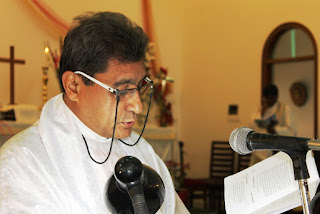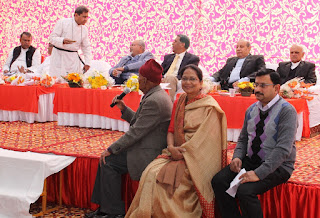The White Horse Photo by Rodrick Lal — National Geographic Your Shot: When I saw The White Horse, an art installation by Mark Wallinger, it was an amazing sight. It had been placed below another photograph showing a woman spreading her hand out before a ship at a shipwrecking yard. The snap was taken with a mobile phone at the British Council Library at Kasturba Marg, New Delhi.
"Happy are they, in my opinion, to whom it is given either to do something worth writing about or to write something worth reading; most happy, of course, those who do both." Pliny the Younger-Letter to the historian Tacitus. C. AD 106
Saturday 30 January 2016
Friday 29 January 2016
A Glimpse of the DEBSOC finals
Finally after a wonderful start with an idea and the zest of young minds nurtured by their Senior Proramme leader and a Faculty advisor, a handful of students were able to not only start the debating society in the school, but also organise a debating event that ran through the preliminary, semifinal and then culminated in the final stage on the 25th of January just a day before we celebrated Republic Day! It took quite a few months of staybacks and practice sessions to finally create a culture of debating that had some difference from the MUN style of debating that our students are adept at. It took quite a few sessions of mock debates and trial runs to finally allow the idea of turncoat debating and formal debating to sink in as an independent format. The road ahead is going to be tough but rewarding,I hope, with our students undergoing the acid test of formal debating by playing host to other schools and themselves participating in inter-school events. The support of teachers as judges,(Kaye Ma'am, Jyoti P. Ma'am, and Niyati Ma'am) and the silent workers like the Logistics Support in charge,(Renjitha Ma'am) and of course the source of strength that came from the Senior Programme leader(Vishna Karthik Sir) made it possible for DEBSOC to become a viable debating society in the school. Pasted below are a few photographs taken on the 25th of January, the day of the DEBSOC finals:
Sunday 24 January 2016
Confusing Reflections Photo by Rodrick Lal — National Geographic Your Shot
Confusing Reflections Photo by Rodrick Lal — National Geographic Your Shot: This peacock allowed me close enough to take a snap with an 18-55 mm lens because it was distracted by the refelctions it could see in the church window.
Just about to land! Photo by Rodrick Lal — National Geographic Your Shot
Just about to land! Photo by Rodrick Lal — National Geographic Your Shot: This is a photograph of parrots and pigeons feeding together. The moment I stepped in it was to see a couple of pigeons landing to share in the feast. I wonder who was more surprised, the parrots or me. I had to use a flash as there was a thick fog, and the lighting was bad. And yes I took this shot just after entering the church premises on a cold, foggy sunday!
Monday 11 January 2016
Celebration of 150 years of service at the Church of The Epiphany, Gurgaon
The tenth of January, 2016, marked t he hundred and fiftieth year since
the foundation of The Church of The Epiphany, Civil Lines Gurgaon. The church
was built in the year 1866 as a Garrison church for the British Garrison based
in Gurgaon. While services were first conducted in English British for the army
personnel based in the Cantonment, (the Hindi service being conducted in a small
chapel in what is now Sadar Bazaar, Gurgaon) it was only later that Hindi
services began to be conducted in the existing church.
The Church of The Epiphany, at Civil Lines, Gurgaon has had great importance for
me especially because my grandfather, Revd. Moti Lal was the presbyter in
charge many years back, and then my Father, Late Frederick Narinder Lal was
baptised in this church, and he is now buried in the old church cemetery. My
association with the church began from the year 1985 when I migrated from from
Ethiopia for further studies. I have been worshipping since then. Most of my
uncles and aunts have been baptised in this church. The church has grown in
strength and outreach, and new church building had to be built in order to
accommodate the growing number of parishioners post the boom in Gurgaon on the
sixth of January, 2009.
The Chief guest on the occasion was the Hon’ble Justice Vikrameet Sen, and the
Convenor of the function was Mrs. Marion Sircar. Revd. Brother Monodeep Daniel
of the Brotherhood delivered the sermon. He spoke at length about how the Church
is most primarily formed out of the fellowship of the devout, and that the
building itself comes second. The occasion commenced with a short worship at the
old church building followed by the main service conducted in the new church
building by the Presbyter in charge, Revd. Sunil Ghazan. The day saw a packed
church with members of the congregation turning up in large numbers and a large
number of guests arriving in large numbers.
There was a fellowship lunch at the end of the service. Elder members were
honoured with garlands, and a video was presented depicting congregation members
who worshipped starting from the year 1950. Revd. Patrick Moti Lal, Mr. Roman
Mukherjee, and Colonel (retd.) I,P Datta spoke about the history of the church.
Thursday 7 January 2016
The Socratic Seminar Pedagogy, and Implementing the Ron Berger Critique - A Workshop by Tom Fehrenbacher
This time when we returned from our winter break on the fourth of January, we were eager participants in a workshop conducted by Tom Fehrenbacher of High Tech High school. The key areas explored included using the Socratic method of teaching, and implementing the Ron Berger Critique to make reading more meaningful. Also, we went through the steps required to roll out a project for students. We also had out lighter moments, and we felt time fly!
A lighter moment with Tom, Kaye and
me
Ruchika Ma’am delivering a point during the
workshop
The teachers workshop conducted by Tom, of High Tech High
school focussed on the Reciprocal Teaching methodology, followed by the
Socratic Seminar Pedagogy, and the implementation of the Ron Berger Critique as
a means of lending meaning to improving students’ ability to read
effectively.Tom took the teachers through the whole process of organising a
Socratic Seminar in a class room situation, and he focussed on the need to
“Consider essential questions” regarding the lesson’s “objective or project
theme.” Post the Socratic Seminar activity, Tom exposed the teachers to the
Implementation of the Ron Berger Critique which included selecting student work
samples in three categories including those that exceeded expectations, those
that met expectations, and those that were low in meeting expectations. In this
case, the teachers were given samples of students’ research papers at the grade
ten and eleventh levels which they analysed using the Ron Berger Critique
structure.
The teachers pondering on a point thrown by
Tom
The objective of the Reciprocal teaching methodology was “to
achieve a better understanding of selected texts through a group work process.”
The important assumptions were that, “difficult and demanding texts will
confront most readers over time.” The idea of the Reciprocal teaching
methodology was to help students develop techniques which would help them
develop strategies to tackle difficult texts. A major assumption in this
workshop was that reading skills are not limited to the English Language
subject, but in fact they extend to all the subjects that require the reading of
complex texts in order to comprehend and understand principles, definitions, and
assumptions. Reading is apparently an activity that is social in nature and that
it can help students help each other collaboratively in understanding the text.
Reciprocal teaching is all about reaching into the group work process by
providing a work protocol.
An engrossed group
The Socratic seminar involved the actual process of getting the
assembled teachers to read the text, and then form into pairs with one of them
being the “guardian angel” who would monitor and give feedback to the “assigned
players”. After each activity, the roles were reversed. The seminar activity
started with one student being asked to “read and share their prepared question.
One strict rule was that “only players might speak, Guardian angels may not.”
Throughout the activity it was made clear that teachers should avoid
contributions at all costs, thus making the activity a truly student led
activity!
Making a point
The Ron Berger Critique phase came after all the other steps in
the workshop. This phase included analysing student samples of work, in this
case research papers submitted by students as term papers. This included
identifying samples that exceeded expectations, those that met expectations and
others that were yet to reach the expected parameters. In this phase, student
samples were analysed by the teachers representing different subject groups, and
the groups functioned as a “mock class”. The mock class was then asked to
evaluate the submitted research papers. The assembled group was then asked to
analyse the work sample as per the following questions: Note something positive,
note something helpful, and note something specific. After the group posted
their ideas, they formulated a plan for revision.
All ears
The task in hand, given to us is to prepare a project in
accordance with the workshop strategy. The teachers have been given their work
areas, and they are supposed to develop a unit that integrates different
subjects into one unit. In our groups case it was about “Why Teenage Mortality
is a concern for us today.”
What I liked about the week long workshop was they way it was
conducted. It was conducted in a most democratic way, almost verging on the
informal and yet a most effective manner. What goes to the credit of Tom is the
fact that he was able to get everyone involved in the workshop, even those who
spoke less. The more active participants were given due credit, and those who
were less forthcoming were drawn into each activity, making them feel more
involved!
I have been an advocate of the Socratic method of teaching and
have even written a piece on the Socratic method of teaching a link to which I
have pasted below:
A special thanks to Aruna Ma'am and Sankalp Sir for the snaps!
Subscribe to:
Posts (Atom)
































